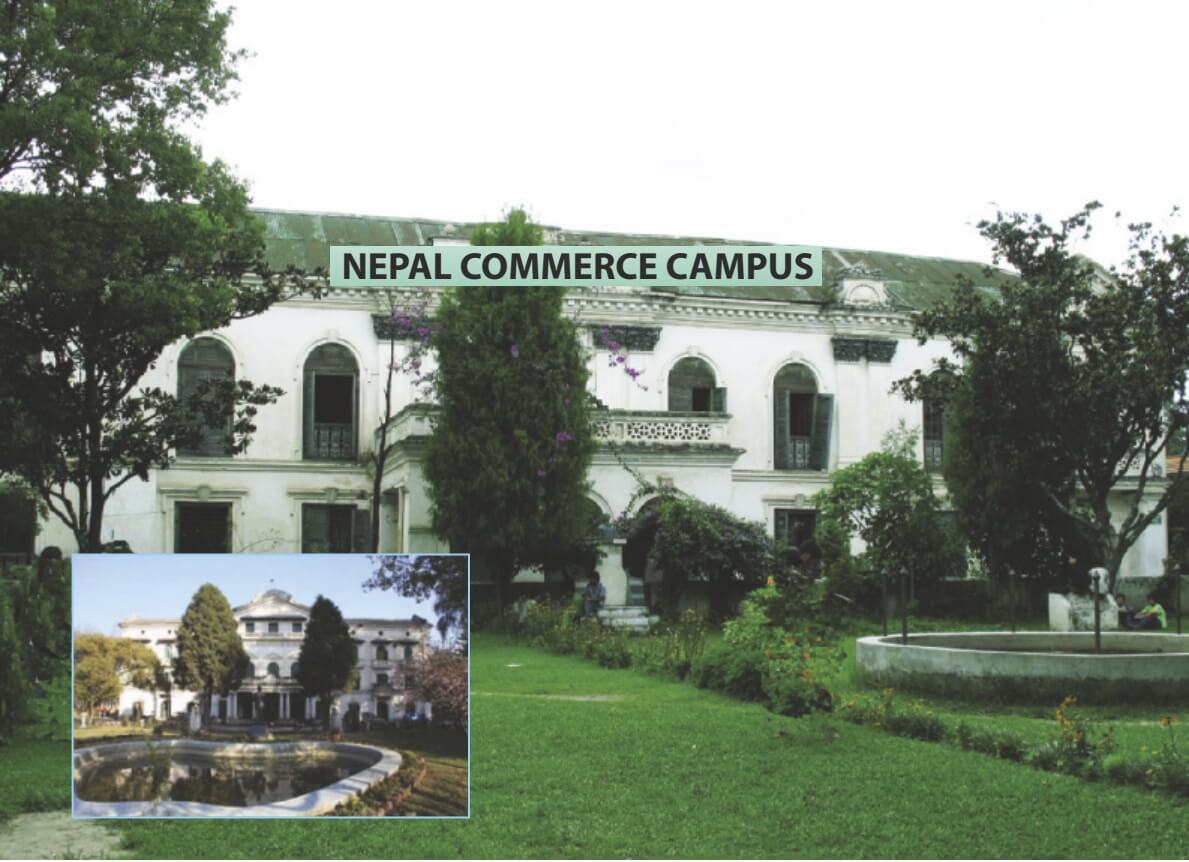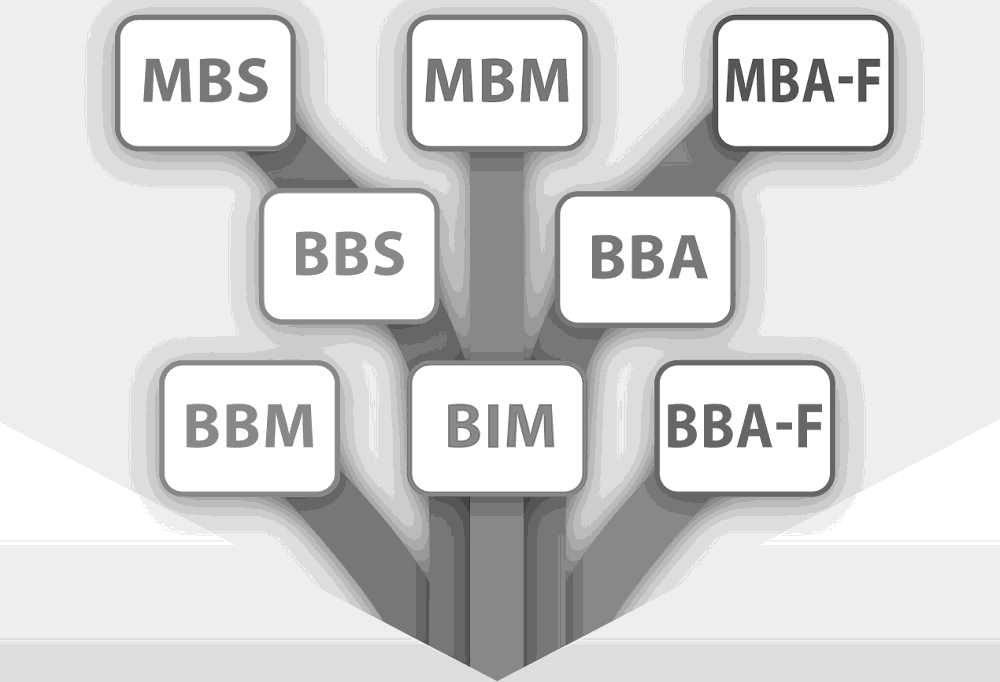Overview
Nepal Commerce Campus (NCC) was established in 1964 (2021 BS) as a public campus in Minbhawan, New Baneshwor, Kathmandu, Nepal. Initially, it had two programs: an intermediate of Commerce (I.Com) and a bachelor of commerce (B.Com). It is affiliated with Tribhuvan University and recognized by the University Grants Commission (UGC).
Over its long history, the NCC Campus has demonstrated itself as a leading management campus by actively preparing professional managers to meet national needs and compete in the 21st-century international market.
Since its establishment, Nepal Commerce Campus (NCC) has been instrumental in the country's industrial and commercial development by producing skilled and professional managers. It is ideally located in spacious premises in the heart of Kathmandu Metropolitan at New-Baneshwor. With its experienced, dedicated, and enthusiastic team of professors, scholars, and intellectuals, the NCC College has already produced thousands of Bachelor's and Master's Degrees Students who are consistently working as distinguished dignitaries in various posts in the civil services, the private sector, and outstanding national and international institutions.
Nepal Commerce Campus, Minbhawan, Kathmandu, offers Bachelor and Master degree management programs such as Bachelor of Business Administration (BBA), Bachelor of Information Management (BIM), BBA Finance, Bachelor of Business Management (BBM), Bachelor of Business Studies (BBS), Master of Business Studies (MBS), MBA, MBA-Finance and Master of Business Management (MBM). It provides Undergraduate (UG) and Postgraduate programs at moderate and affordable fees. NCC also offers many scholarship facilities based on merit lists and quota systems. It has also been listed as one of Nepal's Top Ten Management Colleges.
Nepal Commerce Campus, a leading educational institution, envisions providing management education that is compatible with the changing global environment through a techno-information system. It is committed to a team of experienced professionals who impart practicality to textual and conceptual materials. The vision reflects the campus motto, "CENTER FOR EXCELLENCE."
As a semi-autonomous, not-for-profit educational institution, the Campus's mission is to empower the new generation through practical, research-based teaching-learning processes that will enable them to achieve stability in management and professional disciplines after completing the course and meet the requirements of different sections.
NCC Campus provides various state-of-the-art facilities, such as a Cafeteria, sports facilities, conferences, counseling, a Hi-Tech Classroom, a Library, Multimedia, a Conference Hall, Placement, Educational Tours, Scholarships, Parking, a Journal, Computer Labs, and the Internet.
With a history of more than five decades, the Nepal Commerce Campus has proved itself to be a leading management campus in Nepal. Since its inception, the Campus has aimed to impart quality management education to students. In line with this zeal, the Campus has been instrumental in preparing professional managers and providing management education pragmatically. Initially, the Campus had two programs; - Intermediate in Commerce (I.Com.) and Bachelor in Commerce (B.Com.). The Campus has phased out the intermediate-level program. It is running, at present, both programs, the general (i.e., BBS, MBS) and professional (i.e., BBA, BBM, BIM, BBA-F, MBM) management programs of Bachelor and Master levels under the umbrella of Tribhuvan University.
With its experienced and dedicated faculty, the Campus has already produced thousands of students suitable for the country's needs. Its output serves various posts in different organizations, both national and international. The Campus provides management education compatible with the global environment and is keen to prepare the graduates to stand firmly by national and international standards. The application of modern techno-information systems to pragmatic textual and conceptual materials has become a natural phenomenon on the Campus.
As a pioneer educational institution in the country, the Campus is exclusively devoted to empowering the new generation with the knowledge and skills needed to become high achievers in the ever-changing global context.
Nepal Commerce Campus (NCC) has been determined to achieve its goal since its existence. The campus has stood as a formidable wall against different circumstances in its life. It is very eager to create both a physically and psychologically safe environment for its learners so that they can contribute innovative and creative ideas. NCC believes its students need a 'hope for success' mindset rather than a 'fear of failure.' It is known to all that scared and demoralized ones cannot innovate, be creative, or be agile.
Knowing the challenges of globalization in business and workforce diversity, we aim to produce competent business professionals who project the best image of NCC in every sector and society they engage in. It involves their students in project activities, research work, seminars, presentations, and group discussions to develop their interpersonal and organizational skills.
To maintain its glorious history and legacy, the school's valued faculty members believe in creating a learner-friendly environment that will materialize its students' dreams and expectations.

Timeline
1964
Nepal Commerce College (NCC) was established on May 14. It started the Intermediate in Commerce (I. Com) program with 40 students, four faculty members under the leadership of Founder-Principal Gehendra Bahadur Rajbhandari, and three staff members. NCC became the first private College to impart commerce education in the Lalitpur district.
1966
The then-king of the country, Mahendra Bir Bikram Shah, inaugurated the College. It started homework for advancing to a bachelor-level program in commerce.
1967
The Bachelor in Commerce (B. Com) program started in the College with 45 students.
1973
According to the New Education System Plan, the College came under the umbrella of Tribhuvan University, Institute of Business Administration, Commerce and Public Administration; the College was renamed as Patan Campus. Thereon, the Campus became one of the constituent campuses of Tribhuvan University.
1976
The Campus was moved to New Baneshwor, Kathmandu after Min SJB Rana purchased a beautiful palace there.
1980
The two-year intermediate-level program, Proficiency Certificate in Business Administration, was initiated on Campus. The intermediate in Commerce (I.Com) became discontinuous.
1982
The Campus was again renamed Nepal Commerce Campus. It started a Master' s-level program in business administration (MBA) with 55 students.
1996
The Bachelor in Business Studies (BBS) is a three-year program initiated on Campus. The two-year bachelor-level program became discontinuous.
2000
The two-year Master of Business Studies (MBS) program was initiated on Campus. The two-year master's level program in business administration became discontinuous.
2002
The Bachelor of Business Administration (BBA) program, which has eight semesters of six months each, was initiated on Campus. The Proficiency Certificate in Business Administration program became discontinuous.
2013
The four-year Bachelor of Business Studies (BBS) program was initiated on Campus, and the three-year BBS program became discontinuous.
2014
The Master of Business Management (MBM) program was initiated on Campus for four six-month semesters in addition to the existing two-year MBS program.
2015
The Campus initiated the Bachelor of Business Management (BBM) program for eight semesters of six months each. This program was added to the existing BBS and BBA programs at the bachelor's level.
2016
The Campus initiated the Bachelor of Information Management (BIM) program for eight six-month semesters. This program was added to the existing BBS, BBA, and BBM programs at the bachelor's level.
2016
The Campus has become an esteemed institution with four bachelor's and two master's programs, 107 faculty members, 21 M.Phil. and 15 Doctorate holders, 75 administrative and support staff, four publications, two journals, and about a dozen scholarship schemes for deserving students.
2019
The Bachelor of Business Administration in Finance (BBA-Finance) program, which lasts eight semesters and is six months each, was launched on the Campus. This program is an addition to the existing ones.
2022
Master of Business Administration in Finance (MBA-F), four semesters of six months each, more specialized with specific subjects related to BBA-F.
Courses offered:

-
Bachelor of Business Studies (BBS)
-
Bachelor of Information Management (BIM)
-
Bachelor of Business Management (BBM)
-
Master of Business Studies (MBS)
-
Master of Business Management (MBM)
-
Bachelor of Business Administration (BBA)
-
BBA-Finance
-
MBA-Finance
ADMISSION CRITERIA (BBA / BBM / BIM / BBA-F)
-
BBA: 99 Seats
-
BBM: 88 Seats
-
BIM: 66 Seats
-
BBA-F: 66 Seats
Eligibility
-
Minimum D grade in each grade 11 and 12 subject with CGPA 1.8 or Passed +2, PCL, Intermediate or other equivalent level from TU or other board, institution, or university recognized by TU with at least second division marks in aggregate.
-
Studied English as a full paper carrying at least 100 marks.
-
Secured sufficient marks in the CMAT exam as well as in personal interviews.
-
The minimum CMAT score is 40%.
Admission Procedure
-
Collect application forms and prospectus from the campus.
-
Fill out and submit the application form with the necessary documents.
-
Collection of admission cards for the entrance examination.
-
CMAT test.
-
Shortlisting.
-
Personal Interview.
Weightage
-
CMAT: 50%
-
+2 Score: 40%
-
Interview: 10%
Scholarship and Awards
- A 100% tuition fee waiver will be awarded to the semester topper.
- A 50% tuition fee freeship will be given to the second topper.
Tuition fee waivers are available for students from Dalit, Janajati, and Madhesi communities as well as students from remote areas.
According to the rules set by the dean's office, 10% of community college and school students will receive 50% of the total fee free of charge.
Library
Physical and digital libraries provide exemplary services to students.
-
The campus has an enhanced physical library that offers reference and circulation services from 6:30 AM to 5:00 PM (except on public holidays).
-
Resources available:
-
65,000 books,
-
4 journals (own publication),
-
Thousands of reports and dissertations/theses,
-
Audiovisual materials, maps, and photographs.
-
A well-connected digital library allows access to numerous online resources.
-
Features:
-
Broadband internet and Wi-Fi for quick access to teaching and learning materials.
-
A congenial environment for resourceful learning for students and faculty members.
Other Highlights
-
Excellent computer laboratory and library.
-
Use of multimedia for teaching and learning.
-
Well-furnished classrooms.
-
Regular seminars and presentations.
-
Guest lectures, audio-video aids, films, industrial orientation, focused group surveys, project work, and publications.
-
Wi-Fi inside campus premises.
Extracurricular Activities
The campus organizes regular extracurricular activities to help students explore their inherent potential. Students are encouraged to participate in various activities organized by the campus and external institutions.
Publications
-
"PRAVAHA": An annual management journal published by the campus.
-
"Prayash": A management journal published annually by the BBA wing.
Faculties
In addition to core faculty, the campus utilizes visiting faculty members from universities and the private and public sectors.
-
The Steering Committee handles faculty selection before the commencement of each semester, based on the candidate's aptitude, qualifications, and exposure.
Examination
-
The program is completed in eight semesters.
-
The internal (ongoing) evaluation/examination is given 40% weightage, while the external (semester) examination is given 60%.
-
Internal evaluation includes:
-
Attendance, discipline, quizzes, class participation, class tests, assignments, seminars/workshops, and other tasks prescribed by faculty members.
-
FOM conducts semester examinations.
-
To qualify for semester examinations, students must secure at least 50% marks in internal evaluations and pass both exams separately.
Pedagogy
-
Teaching methods combine theoretical and conceptual knowledge through:
-
Class lectures, group discussions, case studies, role plays, practical exercises, laboratory work, project work, term papers, and internships.
-
The teaching approach prepares students for professional challenges in a dynamic business environment.
-
Faculty adjusts teaching methodology based on course needs.
Make-up Examination
-
Students failing one or more courses can take a make-up examination in the subsequent semester.
-
Allowed to appear in only two courses (6 credit hours) during the make-up examination.
First Term & Pre-Semester Examination
-
A first-term and pre-semester examination is conducted before each semester examination.
-
Students failing the pre-semester examination cannot sit in the semester examination.
Attendance
-
An 80% attendance is required to be eligible for the semester examination.
Grading Policy
-
To pass internal and external examinations, students must secure a minimum of:
-
50% (Grade Point 2.7).
-
A minimum Grade B or CGPA of 3.0 (60%) is required to pass the semester examination.
Credit Transfer and Withdrawal
-
Students may transfer up to 30 credit hours to a comparable program at other universities recognized by TU.
-
The Faculty of Management has the final authority on such decisions.
Graduation Requirements
To graduate, students must meet the following criteria:
-
Credit Hours:
-
Complete 120 credit hours for BBA/BBM/BIM/BBA-F.
-
Complete 126 credit hours for BIM.
-
Minimum Pass Grade:
-
Secure a minimum Grade C in all courses with an aggregate CGPA 2.0.
-
Achieve Grade C in the internship program.
-
Program Completion:
-
Complete the program within 7 years of registration.
Summer Project
-
Writing a Summer Project (SP) report is mandatory for BBA, BIM, and BBA-F graduation.
-
The SP is an off-the-classroom and field-based study project, allowing students to reflect on and integrate their learning.
-
Reports must be original and related to any area of business administration approved by the Research Committee.
-
Reports are submitted in the prescribed format to the Research Committee via supervisors.
Objectives of the Summer Project
-
Enhance research skills in data collection, processing, analysis, and report writing.
-
Develop academic and practical skills in data analysis, critical writing, and presentation.
-
Prepare students for a professional career in management.
Internship
-
All students must complete an industrial attachment project in the final semester.
-
Internship Details:
-
Duration: 8 weeks at an organization.
-
Requirements: Prepare an individual project report based on work performed in the organization.
-
Evaluation: Based on the organization’s report, project report, and presentation.
-
Submission: Reports are submitted by the end of the eighth semester.
-
Grading: Students must secure a Grade C in the internship.
-
Weightage: Equivalent to 3 credit hours in BBA, BIM, and BBA-F, and six credit hours in BBM.
Document:
Nepal Commerce Campus Prospectus.Pdf
Contact Nepal Commerce Campus's administrative office for detailed information on the course, admissions, location, fees, scholarships, facilities, counseling, or eligibility.
Address:
Nepal Commerce Campus (NCC)
New Baneshwor, Minbhawan, Kathmandu, Nepal.
Phone: 01-5917742, 01-4798126 (BIM), 01-4790143 (BBA-F, BBM), 01-4790148, 01-4790144 (BBA)


















